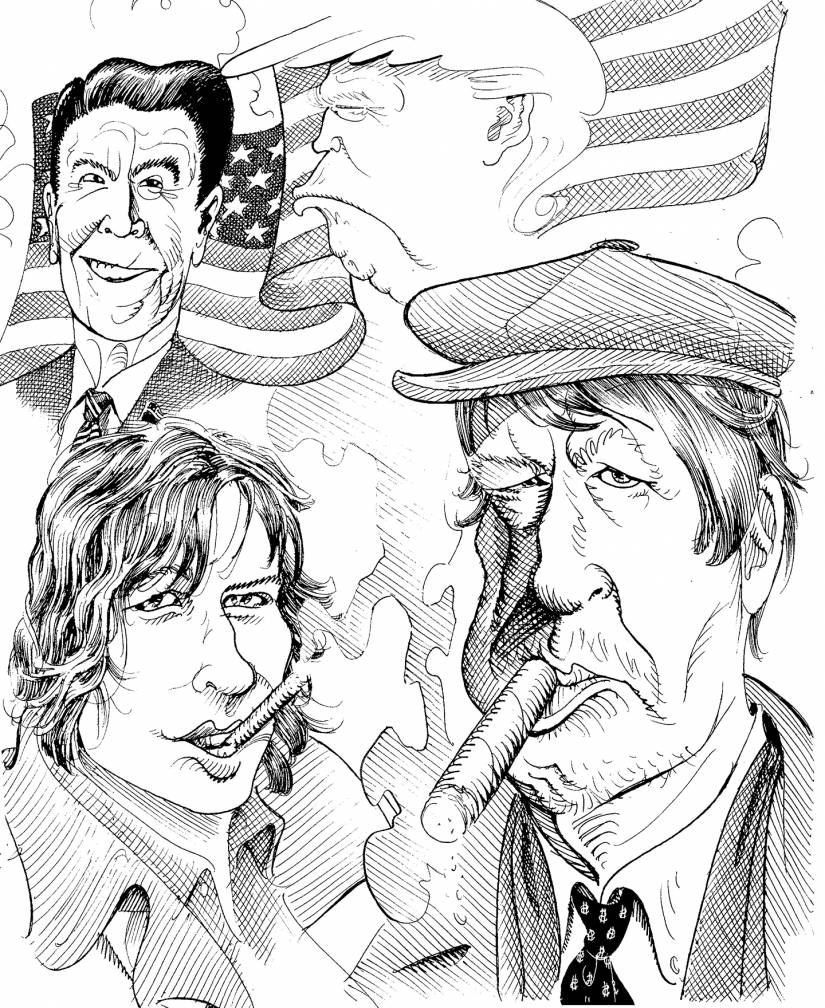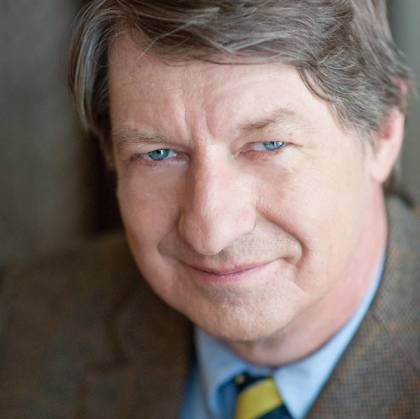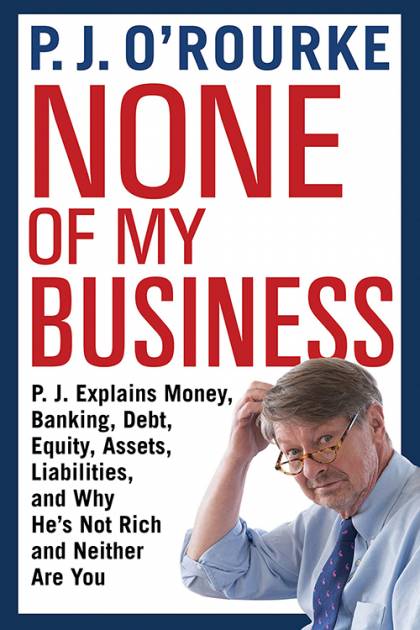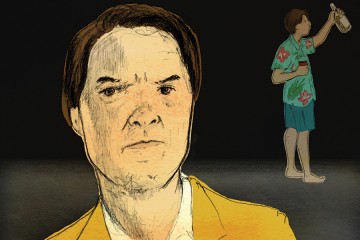In P.J. O'Rourke's 19th and newest book, None of My Business (Grove Atlantic), the political satirist, seasoned political reporter, and foreign correspondent turns to something he admits he never studied in school: economics. In 2014 he was asked to speak at an investment advisory firm's conference in Las Vegas and wondered if he was too stupid to talk about business. He soon realized that a well-traveled reporter gets a foreign correspondent's education in economics, as it's inevitably wrapped up in politics. And as somebody who covered upheaval in Albania, China, Iraq, Lebanon, Somalia, Pakistan, and elsewhere, he'd probably have some pragmatic, anecdotal experience to talk about.
That speech led to another, which led to O'Rourke contributing a column to the firm's newsletter, which led to the creation of American Consequences, a right-leaning magazine exploring that intersection of politics and financial news, for which O'Rourke is editor-in-chief. He can no longer claim to be economics-impaired. And the pen that once observed that "earnestness is just stupidity sent to college" hasn't softened with age: "The only good news for ordinary people during the Middle Ages was the Black Death. It did have side effects in the 1340s and 1350s, killing between 30 percent and 60 percent of Europe's population. But consider the benefits: upward pressure on wage rates and benefits packages resulting from supply-side labor market shortfalls."
Johns Hopkins Magazine recently caught up with O'Rourke, A&S '70 (MA), to talk about learning about economics in war zones, how politics and economics intertwine, and being the business version of the armchair quarterback giving New England Patriots coach Bill Belichick unasked-for advice.
Early on in None of My Business you mention that you learned about economics while reporting on people trying to kill each other. How did you begin to recognize that economics education in your journalism? I can't imagine you being in Somalia and taking the AK-47 from the kid in the security detail to stand perimeter while the flag gets fixed and think, "This is a valuable lesson in understanding currency as a medium of exchange."
No, it came on me slowly as I got older and I'd done more of this. I'm trying to think when this was. I suppose it was in the late 1990s, or so. I'd been a foreign correspondent for about 10 years, and a continuing puzzling question when I'm covering these places, traveling all over, is why are some places so poor and other places so rich?

Image credit: Tim Kreider
It's easy to explain with a war, but then you go to a place like Tanzania where there wasn't a war—I think it was Tanzania that really set me to thinking about this. Also, my first kid was coming along and I was looking for something that I could do at home, or didn't require quite as much travel.
I'm in Tanzania and I'm thinking this country's peaceful, the people are really nice. It has tons of resources and potential. Everybody seems to be pretty pulled-together here. It's not splendid infrastructure, but it's sufficient. Yet it's one of the poorest countries in the world.
I've been in and out of Hong Kong for years because everybody who covers Asia uses Hong Kong as a hub and a place to get clean sheets and a hot shower. And Hong Kong imports its water. So what gives here? That kind of set me on the course of learning about economics.

Image caption: P.J. O'Rourke
And then, of course, I realized how abysmally ignorant I was of economics because as a liberal arts major, I'd never taken anything in the field. So, I got a classic econ 101 text, which made no sense to me and immediately put me to sleep. I started to ask around. I started to educate myself about this with the help of some econ professors and some people that I knew that understood economics. It took awhile.
But you did educate yourself. You capably talk about "price-earnings ratios" and "dividend yields" and "CPI" in your arguments, so you know what you're talking about.
I know what I'm talking about in the abstract. I'm knowledgeably ignorant. I know just enough that it all means something to me. This is sort of like listening to the fat guy up in the football stadium screaming about what play the Patriots should use. I'm not saying I'm any kind of expert, but I am informed enough about the plays and the players, the rules and violations thereof, the rules and referees, that it all becomes very interesting to me.
You wouldn't want to put me on the field, and you wouldn't want to put me in charge of your business. I really don't know anything about businesses in any sort of practical way. I've always wondered what would happen if suddenly Belichick said, "Hey, wait a minute, that fat guy up there in seat 40 row ZZZ has a good point about defense!" I'm a fan in the stands.
So you're not going to do any sort of desktop trading?
No, I wouldn't even begin to know about that or trust myself. I know just enough about mathematics to keep me from ever gambling in Las Vegas. I know just enough about business to keep myself from ever investing.
I was quite pleased that in the chapter on innovation, you included a quick parenthetical paragraph about the number of caveman examples you were using. At that point it seemed like, "There seem to be a lot of cavemen in this." You mentioned that for yourself because you have a Fred Flintstone understanding of how the economy works, but you also wrote that there's something about economics that brings out the caveman in us. Why do you think that is?

The struggle to survive. It takes the story right back to basics because when it comes down to it, this is all about feeding and clothing and sheltering ourselves, however else we dress it up.
I read Seymour Hersh's memoir last month. He notes that, yes, warlords and politicians and the like can do pretty extreme things as part of what they do, but the professional business class of America has some pretty ruthless people in it as well. Would the business jerks that you mention in None of My Business fall into that category for you?
There's some pretty ruthless people. People like Seymour Hersh, though, always forget that however ruthless and horrible people may be, without the actual power of the law and government in their hands, they don't have the ultimate tools for ruthlessness. There's always been a comparison. Leftists like Hersh are essentially pro-government. They're saying, "Yes, of course government does some very bad things but look how ruthless businesspeople are," but ruthless businesspeople don't have the legal monopoly on deadly force that government has.
Of course, there are situations and places where they do or they did have that, and that is a situation much to be avoided. You do not want business people to own the government, and I would argue that they don't, even under the worst circumstances. They don't own the government. They may occasionally rent it, but they don't own it. Therefore, the comparison between ruthlessness of politics and ruthlessness of businesses is, under the rule of law, a wrong comparison.
For him it was, in one instance, business and lawyers were able to block something being published while the Pentagon wasn't. Influence exists in many different ways.
Power does have its ironies, there's no doubt about that, but business couldn't send you to jail for publishing something in the same way that government could.
Blockchain, Bitcoin, cryptocurrency: I'm glad I'm not the only person who's both confused by, and a bit suspicious of, it. What drew you to explore it in the book and in your columns? Is it just because it's something that businesspeople are wrestling with and exploring these days?
Yes, it was there, especially just as I was writing the book. Bitcoin was having its day in the sun, so it was on everybody's mind. My skepticism seemed well-proved after the fall, though Bitcoin has by no means fallen to zero value.
I wish I understood the blockchain technology that's behind this a little better because I am assured by various people who ought to know that this is a very valuable computer innovation. It could mean big changes in the way markets are cleared. All the sort of "backroom" functions of brokerage houses and stock markets and commodity markets and so on will be vastly altered by this permanent transparent, universally visible accounting ledger. To put all sorts of people out of a job. It's going to put the people out of a job. I don't understand what they do, but still.
In one chapter you provide the math behind a belief that I think a number of people share, that in order to live a low-cost life you have to be rich. Is that a political problem or an economic problem or some kind of weird combination of the two?
Both, absolutely. It probably accounts for a certain amount of the voter anger that we're getting such a rich dose of at the moment.
I remember back in 1992 when you were part of a Rolling Stone contingent that interviewed then candidate Bill Clinton in Little Rock, you asked him, "Are people looking to politics to solve problems that can't be solved politically?" Do you feel like we're looking for politics to solve a problem that economics played a large role in creating right now?
Yes, absolutely. I guess the thing that I was trying to, I suppose you can almost say, warn Governor Clinton against then was that. Clinton was the guy with an answer for everything, and he definitely had an expansive view, especially as he was running for his first term. He took a very expansive view of what government could do. I've always worried about that because, this is a Hayekian thesis, once government takes responsibility for everything, once government is seen as the source of all forms of justice, not just legal justice but social justice, economic justice, and so on, the problem there is not so much that it makes for huge government. The problem is that the government cannot help but fail. No one, not God himself, can provide that to humans with free will.
As the government takes on more and more responsibilities and claims itself to have the answer for more and more of our problems, we get madder and madder at government. We may get mad from the left, we may get mad from the right, we may get 2016 mad, we may get 2018 mad, but we'll get mad.
In that same interview you brought up that we're also engaged in what seems to be a losing war on drugs and wanted to know if the continued criminalization of drugs was a wise move. That's, in a way, a political question wrapped up in economics. A quarter century on, what are your thoughts on the war on drugs?
We lost! That seems clear and evident. How we could have done otherwise I don't know. I don't think that there is any kind of political solution to that. It is partly an economic thing; drugs have become much cheaper. That's the source of the opioid addiction, the availability. Price has to be measured not just in dollars and cents. Price also has to be measured in effort and bother, risk, all sorts of things like that.
Any time politicians say, "Well, you know, legalizing marijuana, we'll be able to tax, we'll be able to regulate it. It actually won't increase use." Baloney! Because one of the great costs of marijuana was running some kind of legal risk by buying and selling it, using it. Maybe the risk was small but nonetheless it was a risk, and for respectable middle-class people, or people wanting to pretend to be respectable middle-class that risk was a serious part of the price. When you remove that part of the price, when you lower the price of marijuana, it's econ 101. That much I did understand. Demand is going to go up.
In the introduction to the book you made this Venn diagram of yourself, where you divided the intersection of what you love to do: make fun of people; what you're good at: being a smart ass; and what people will pay you for: making fun of other people. How and when did you realize that this was your intersection? Was it at National Lampoon or was it earlier?
It was at Hopkins. I was at Hopkins as a graduate student, and I came as a graduate student to a program called the Writing Seminars. When I signed up, I was under the impression that I was going to be some sort of poet or novelist, preferably of the kind that was really incredibly hard to understand, probably impossible. People would look at my poetry, and they'd go, "Whoa, whoa, whoa, back to T.S. Eliot for me 'cause that's the easy stuff. A lot of modern poets don't rhyme, but this guy doesn't even reason."
I aspired to that, but while I was at Hopkins, while I was beavering away at being obscure and incomprehensible and very modern and up-to-date, I ran across these people who were putting out a little underground newspaper called Harry. A guy named Michael Carliner started this along with a fellow named Tom D'Antoni, and I became friends with them. I started to write little pieces for them that were totally different from what I was trying to do at the Writing Seminars. It was working with Harry while I was still at Hopkins that I realized that I have a knack for something. It took me a long time to realize that that's where I should go, that it first dawned on me.
When I graduated from Hopkins in '70, I stayed in Baltimore and worked on that newspaper and eventually I ran it. I was having so much fun with it. It took another 10 years before I gave up my literary ambitions, realizing that I had absolutely no knack for literature but I did have a knack for sort of making fun of stuff.
In None of My Business you Googled a computer-generated joke and the best you could find wasn't just bad and boring, it was lifeless. How do you know when something is funny?
That's a very good question and of course it allows for frequently being wrong. Years and years of exposure to humor is probably the only answer to that. I think that most people who are "funny" or think they're funny or try to be funny or however one wants to put it, grew up in families where humor was a medium of exchange. Definitely with the O'Rourkes, and this is not that rare with the Irish, humor was used to express almost a full range of emotions; approval, disapproval, praise, criticism, love, dislike, were all expressed. The only time they would break out of that would be at the funeral of a relatively young person; then they get all serious. Other than that, everything was kind of a joke and everything was put jokingly.
You wrote How the Hell Did This Happen?, your last book, about the 2016 election. As a veteran political journalist, do you miss the chance to be in the field doing some reporting?
Not really. No. I really feel in an awkward position with this because I am a Republican, I am a conservative albeit a libertarian conservative, but I am a small-c conservative, and I hate this guy. I wouldn't have him in my house. He's appalling, yet there's certain things, Supreme Court appointments, regulatory moves, and so on that I approve of. I would recuse myself from politics entirely if I could.
It's a bad period, and I really don't like populism. I think that it has a strong element of the mob, a mob mentality to it. I don't like it on the right, I don't like it on the left, and we've got it in spades. It's not just us, we're seeing this problem all around the world, such as in Brazil. Even the Xi Jinping crackdown on dissent in China is bathed in a sort of populist anger at corruption. Putin is certainly a populist leader.
In None of My Business you mention how the digital age has affected journalism specifically and I was kind of curious: Are there any online media sources that you think are doing a good job of reporting right now?
Not really, no. There's some who do a decent job of aggregating, but aggregating is very different from reporting. The digital world has kind of wrecked the business model for news reporting. It's not cheap, reporting, and it takes a lot of resources. It was never the best paid field in the world, but now it's like unpaid.
It also requires an attention span in the audience that I think we're losing. I think all the tendencies of the internet are toward a shorter attention span, and that's not a tendency that America—we were short enough on our attention span already—not something America needed.
Do you feel that the lack of a business model to support writers is why political satire has moved from the page, though there are still people doing it, to television?
Oh, for sure. I actually saw that happen while I was editor of the National Lampoon. By 1980, when I was editor-in-chief—I'd taken over by the end of '77—by 1980 I was losing the best potential writers, the kids coming out of the Harvard Lampoon, for example, though not the only place, but very smart kids who would've been my recruits were going straight to something like Saturday Night Live. And no fools, they. It was move-the-decimal point in terms of salary.
Did you come up with the emoji version of the Shakespeare quote that comes up in the book? Because it's pretty good.
Yes, I did, with the help of the American Consequences art director, Erica Woods. Erica's brilliant.
You mentioned earlier on that you did not study economics in college because you had a liberal arts education, but I've also heard you say that a strong liberal arts education is still a really good foundation for being an engaged person these days. Do you feel that way?
Oh, absolutely. In fact, in another life entirely I'm on the board of a nonprofit called the Space Foundation, which is an international organization to promote space exploration and so on. We put on a big symposium every year, out in Colorado Springs, where all the space players, everybody from widget makers to United Launch Alliance and Boeing come. The chairman of our board, this guy General Louis Shelton, is a retired four-star general in the Air Force. He was Air Force Space Command. He also had at our board dinner General Jay Raymond, who's current commander of Space Force Command, come talk to us. I was talking to the generals and they're both very good communicators and we were talking about how, no matter what you're doing, even if you go into the military, that ability to communicate, which is at the heart of a liberal arts education, is absolutely vital.
What's next for you? What are you working on? I'm assuming that American Consequences is an ongoing thing.
It is, yes. I just signed up to do another year of that. You know, I don't know. I don't know quite what I'm doing next at the moment. It's been a very busy fall. I just haven't had the time to sit down and think about it yet.
Posted in Voices+Opinion, Politics+Society, Alumni
Tagged alumni, writing seminars, economics, q+a








